Together with other organizations attempts were made in terms of protest actions, information evenings, commemorative events and meetings with the press, social organizations, political parties and government political parties and government, to gain support and sympathy in the Netherlands for the black liberation movements.
This article offers a summary overview of the activities in the Netherlands focusing on Soweto, Steve Biko and the Black Consciousness Movement. The activities in 1976, 1977 and 1978 are detailed in the article Soweto Uprising 1976 3.
1979
PEN
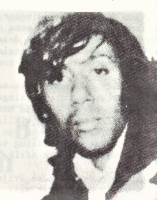
Strini Moodley
The Dutch center of the worldwide association of writers PEN4 adopted the imprisoned journalist/poet and theatre maker Strini Moodley. He took the place of the released Paul Gwala. Moodley was one of the 9 SASO/BPC leaders imprisoned5 on Robben Island.
Strini Moodley formed the black theatre company TECON (Theatre Council of Natal), was Director of the first black South African BlackTheatre Union (SABTU)6 and editor of the SASO Newsletter. Before and after his imprisonment his freedom of movement was restricted with a banning order. After his release he had several leadership positions within AZAPO (Azanian People’s Organization).
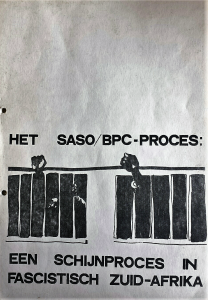
Publication Azania Komitee
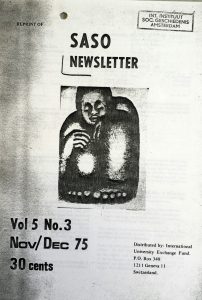
SASO Newsletter
1980
Little Flames
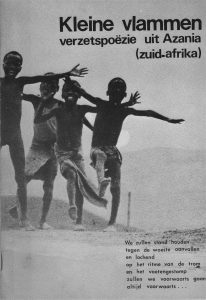
Into Dutch translated resistance poetry
In the centre of Rotterdam the Azania Komitee commemorated the Soweto Uprising in 1976 with music, information and poetry.
The collection of poems Kleine Vlammen, verzetspoezie uit Azania (Zuid-Afrika) was published in the same year with translated poems from 1970-1980. Some of these poems were written by TECON, a theatre company of the Black Consciousness Movement. Poems by TECON had been offered as evidence in the trial against the SASO/BPC 9.
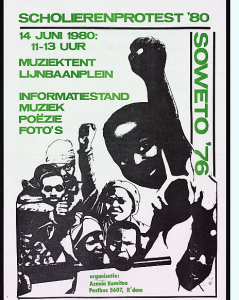
Poster Azania Komitee
1982
Sranan Kultura
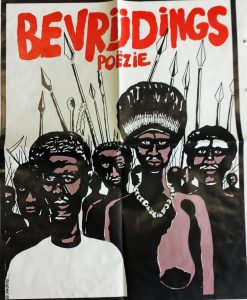
Poster Ro Heilbron
In commemoration of Soweto 1976 the Azania Komitee co-presented with the Federation of Music, Sranan Kultura7, the program Bevrijdingspoëzie. Surinamese poets/singers Paul Middellijn, Romeo Grot and Paul Day recited their poetry. The Surinamese flutist/composer Ronald Snijders and the Guinean percussion group Africa Djolé provided the musical part of the evening.
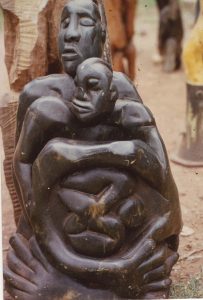
Sculpture Pitika Ntuli
The refugee poet/sculptor/activist Pitika Ntuli of the PAC (Pan Africanist Congress) represented the black voices from Apartheid South Africa.
1983
Protest
Despite the repression by the South African regime sometimes representatives of AZAPO managed to travel abroad. Lybon Mabasa, the then President of AZAPO, visited in 1983 the United States (US), Canada, Spain, Norway, Western Germany and the Netherlands.
Once back in South Africa his passport was revoked by the regime. Not having a passport restricted Lybon Masaba’s freedom of movement and that was unacceptable. The regime could not be allowed to do anything it wanted unnoticed.
The Azania Komitee sent a protest telegram co-signed by several political parties and organizations8. AZAPO received a telegram in support with the same signatories. Azapo spokesman Mkhabela stated the regime’s act was part of its attempts to frustrate, obstruct and eliminate the organization.
Mabasa was having talks in the Netherlands with political parties and social organizations to inform them about AZAPO’s policy and the resistance in the country itself. He emphasized the fact that the trust of the people cannot be won by support from abroad, but by the struggle in their own country.
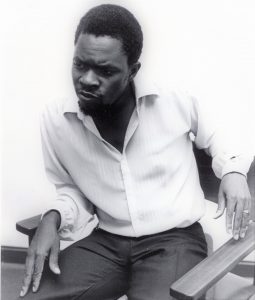
Lybon Mabasa
The several concerned discussion partners asked questions about the position and role of the white minority in South Africa. Mabasa stated that AZAPO had never suggested that white people had to leave South Africa. If white people are unprepared for change they will find it harder to accept a democratic structure and there will be a risk that they will revolt. If among white people (and by white people) widespread awareness-raising takes place that risk can be limited. AZAPO does not want a society that suppresses the whites but a society in which everyone participates as an Azanian and helps to build the nation.
Mabasa was sceptical about NUSAS (National Union of South African Students)9, the white student organization by many people characterized as a progressive democratic student organization. He said that many NUSAS leaders did not play a progressive role anymore after their studies. They ran off to senior posts in industry10.
1984
Black Women Unite
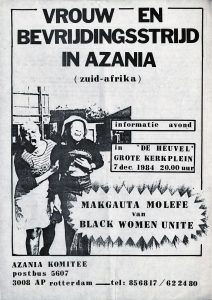
Poster Azania Komitee
Mmagauta Molefe
In 1982 Mmagauta Molefe (AZAPO) formed together with other women the black women’s organization Black Women Unite (BWU). In order to make the work of BWU publicly known she traveled through Western Germany in 1984. At the invitation of the Azania Komitee she made a quick visit to the Netherlands.
She spoke at a meeting of the Evert Vermeerstichting (EVS) in The Hague and in Rotterdam at a meeting of the Azania Komitee. Furthermore she spoke with the CDA (Christian Democratic Appeal) and CPN (Communist Party of the Netherlands) women. The radio program Hoor Haar aired an interview with her.
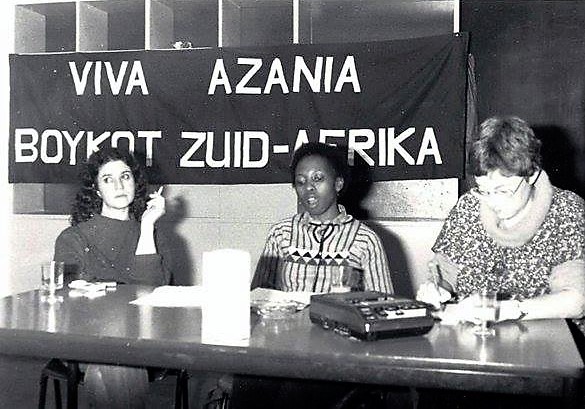
L to R: Irene Scheltes (Azania Komitee), Mmagauta Molefe (BWU), Stoffelien Cool (Azania Komitee)
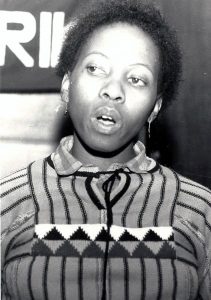
Mmagauta Molefe
Mmakgauta started as a political activist at high school and got involved with the South African Students’ Organization (SASO), the South African Students’ Movement (SASM) and the Black People’s Convention (BPC)11. She was imprisoned on many occasions.
Black Women Unite created community projects and campaigns for homeless people, education, trade unions and support for the families of political prisoners.
In health campaigns BWU pointed out that in hospitals for black people expired medicinal products were prescribed and black patients were used as test subjects. Mmagauta Molefe talked about the anti-Depo-Provera campaign BWU was running at the time. This contraceptive (‘hormonal shot’) was administered widely to black women at the time. This happened frequently, for example immediately after delivery, without their knowledge. The usual dose of this contraceptive is effective to a maximum of 10 to 11 weeks. Black women were administered a dose that was effective for 1 to 2 years. This could lead to permanent infertility and poisoning of nursing mothers. This medicine, a product of the American pharmaceutical company Upjohn, was manufactured in Belgium.
Black Women Unite was part of the National Forum (NF). The NF was formed in 1982 by about 400 black organizations12. ‘Our situation is the result of colonization, capitalism and imperialism. Our concern is to reclaim our country from the colonial occupiers’, said Mmagauta Molefe13.
1986
AZAPO
Anniversary birth Steve Biko
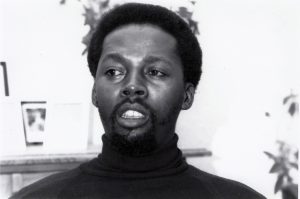
Dan Habedi
In this year Dan Habedi, Vice-President of AZAPO Transvaal and teacher in Soweto, visited the Netherlands. During the many meetings he had in a short time he made it clear that AZAPO was not an Anti-Apartheid Group but a liberation movement. In an interview with Trouw newspaper (7/4/1986): ‘I am not here asking for advice. I am here to straighten things out.’ And ‘our history has been defined by the expropriation of our land. People find it easy to condemn apartheid, but hard to acknowledge that land was taken away from the blacks.’ Habedi criticized the view ‘The land belongs to all who live there, black and white’ in the ANC Freedom Charter. Habedi: ‘The land belongs to the blacks, which does not mean the whites will be driven out of the country. The abolition of apartheid as such does not mean a thing, it is about redistribution of the country’s resources.’
During that period talks were already under way between exiled ANC with influential South African business people and white religious leaders in order to increase pressure on the South African regime. Habedi: ‘The business people consider it urgent to speak with the ANC as an investment for the future. Let them speak with their own servants, the blacks in their shacks. They can tell them everything. That is where their sincerity should begin. See them as human beings entitled to rule their own country.’
Soweto 10th commemoration
In South Africa the regime declared a state of emergency on the eve of the large-scale planned Soweto commemorations14.
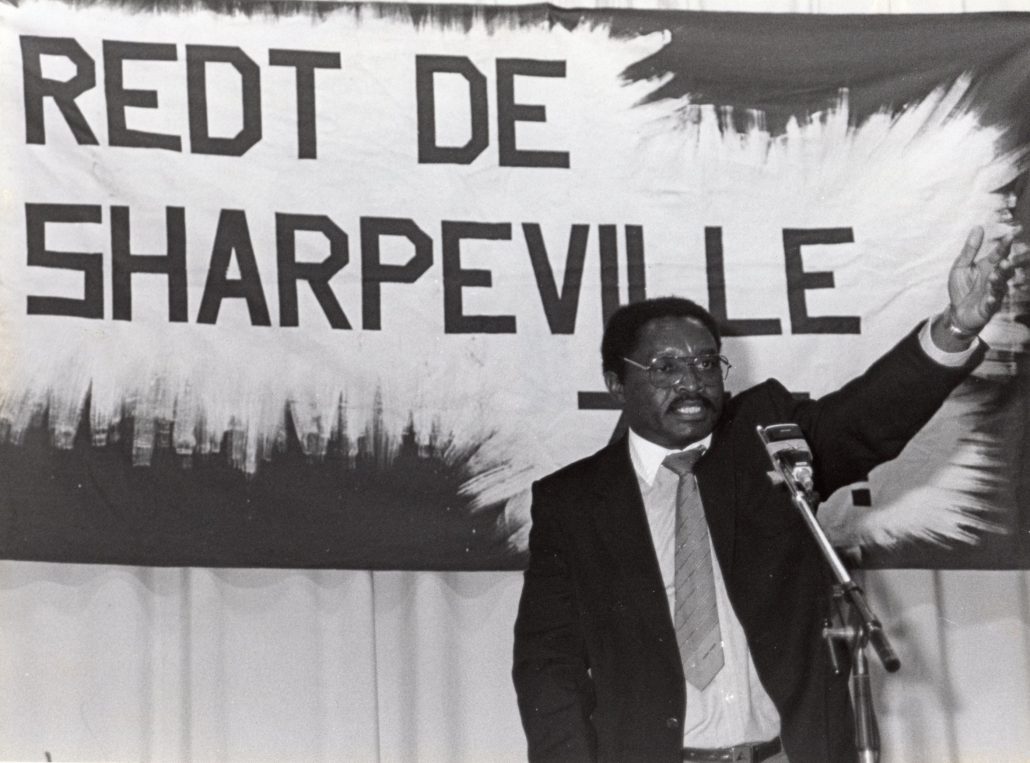
Johnson Mlambo (PAC)
The Soweto commemorations in Amsterdam and Rotterdam were in the spirit of the campaign for the Sharpeville Six sentenced to death. Joyce Mokhesi, sister of one of the convicts: ‘The Sharpeville Six are the victims of a political decision 15’.
For the exiled BCM political refugee Thabo Mkhabane spoke in the Netherlands. Ex-Robben Island prisoner (1963-1983) Johnson Mlambo, then chairman of the PAC, spoke out against any form of partnership with the regime. He outlined that the PAC was striving towards a ‘socialist democratic South Africa without discrimination in race 16.’ Roy Wijks spoke for SAWO (Surinamese Labourers and Workers Organization) about racism in the Netherlands.
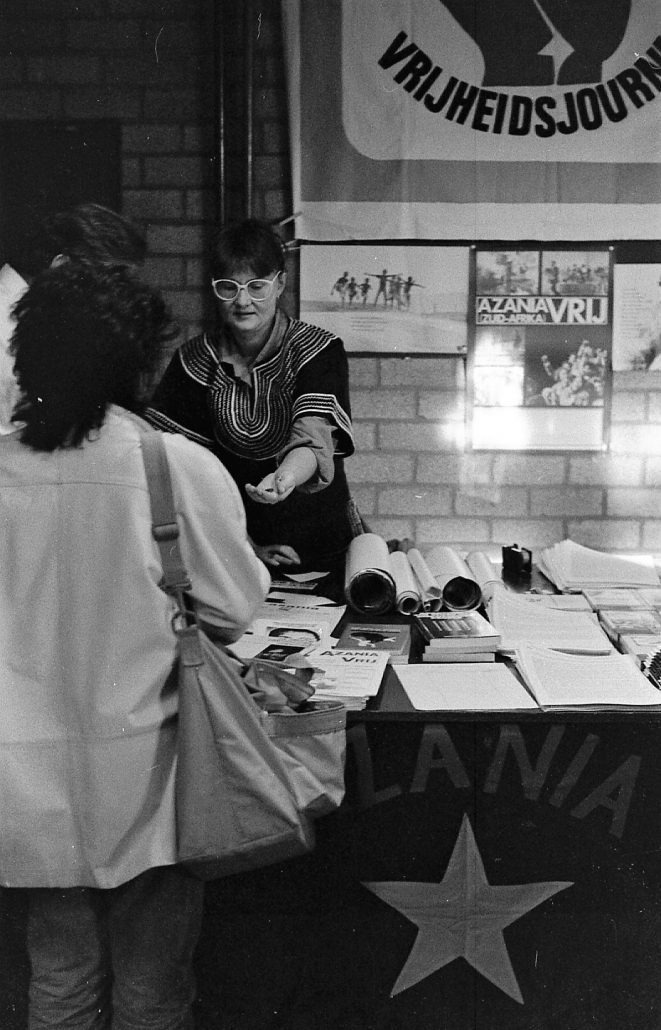
Rita Grijzen (Azania Komitee)
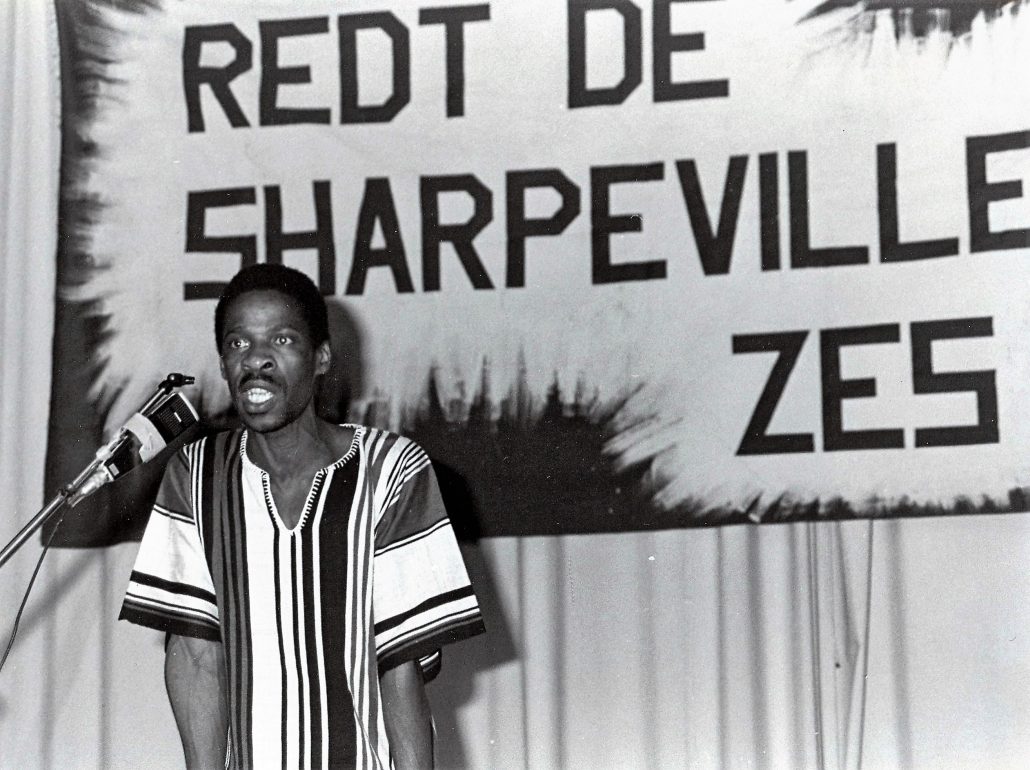
Thabo Mkhabane (BCM in exile)
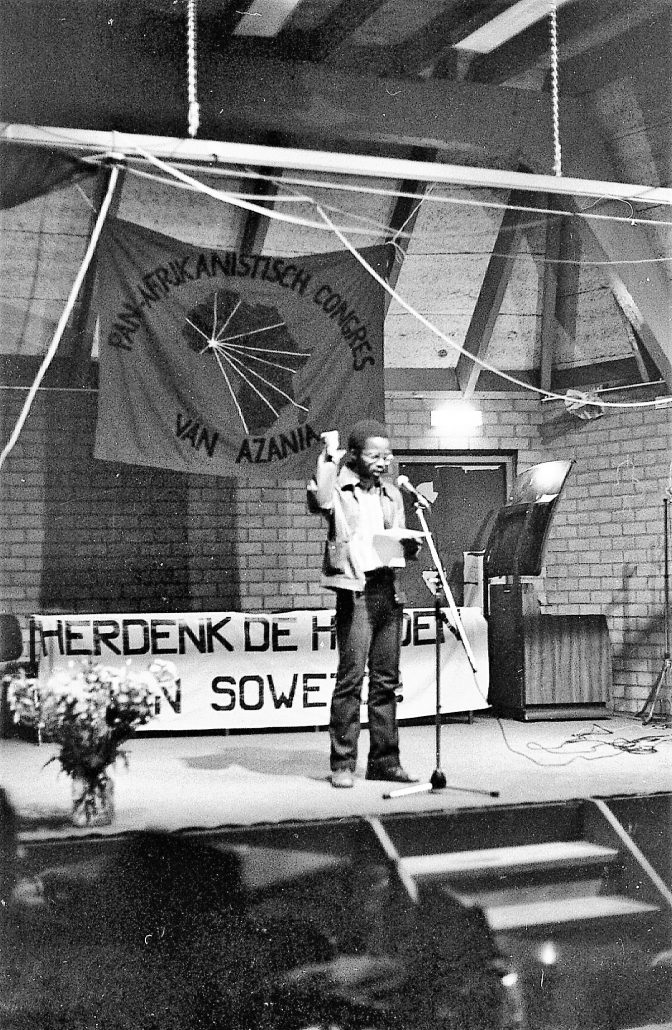
Roy Wijks (SAWO)
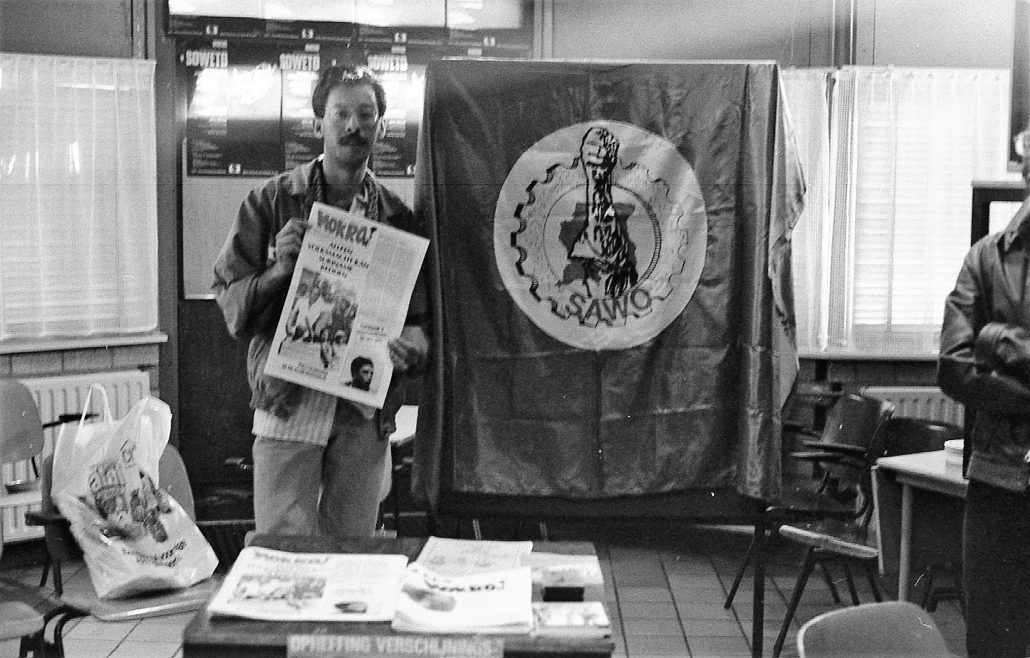
André Reeder (SAWO)
Anniversary of the birth of Steve Biko
At Shell headquarters in Rotterdam the Azania Komitee organized on 18 December together with Rotterdam tegen Apartheid the fortieth anniversary of the birth of Steve Biko.
Cobie Frank, board member of Verenigd Verzet 1940-1945 Rijnmond region and political refugee Mogobe Ramose 17 of the exiled Black Consciousness Movement, spoke.
Ramose: ‘Today the term ‘Black’ carries clear political weight, although our enemies have tried to trivialize it into reverse racism….Many blacks died a hero’s death in a fearless opposition to both the racist ideology of Apartheid and the attempts of the Apartheid regime to function as protection against the legitimate struggle of the native black majority for the repossession of our motherland, which was brutally robbed 18.’
1987
Death Steve Biko commemorated
In spite of police intimidation Steve Biko’s death was commemorated in great numbers in South Africa. Biko died on 12 September 1977 when interrogated by the South African police.
The Azania Komitee commemorated the assassination with a picket line in front of the South African Embassy. The spokesperson: ‘Biko’s message goes far beyond the borders of Azania. That message is directed to the downtrodden and those discriminated against around the world. At the same time it is an admonition directed at the white solidarity movements. Also here in the imperialist West large solidarity groups are operating with pointing fingers and are speaking of ‘black racism’ if whites are not included in the struggle with leading positions. Primarily solidarity must be based on respect for the way in which black people fight THEIR struggle for the repossession of THEIR land. We whites must break free from the racist influence of the colonial past and the imperialist present of our country. Otherwise, we will be useless allies of the downtrodden and those discriminated against. Also here in the Netherlands 19.’
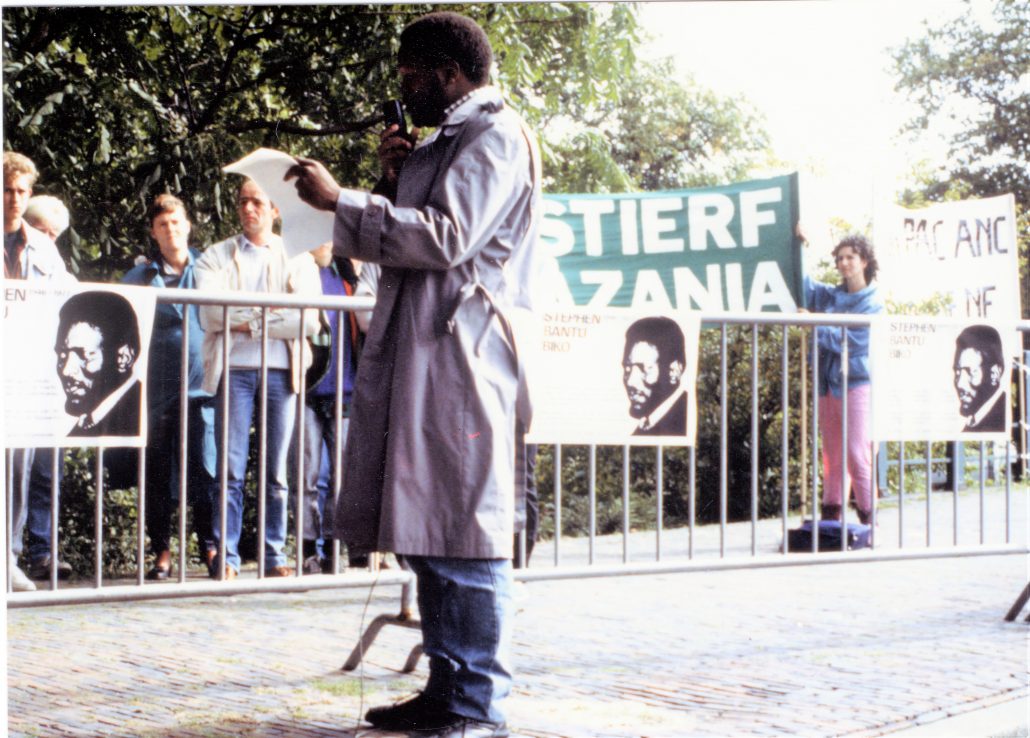
Louis Malete (BCM in exile)
1989
Sihambile Cultural Group
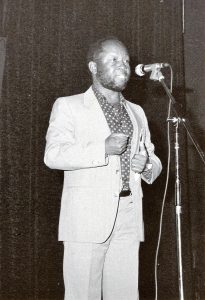
Zakes Mofokeng (PAC)
The Sihambile Cultural Group 20 organized in commemoration of Soweto an information evening with Zakes Mofokeng of the PAC. The poet, playwright, musician and actor Mofokeng was one of the organizers of a cultural boycott of Apartheid South Africa and was active for the union. In the mid-1980s he had to flee his country and ended up in Switzerland.
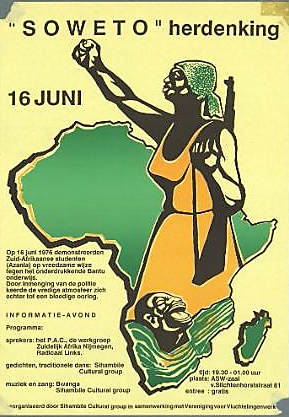
Poster Soweto Commemoration
1990
Ban on PAC and ANC lifted
Steve Bikoplaats (Steve Biko Court) and Lilian Ngoyiweg (Lilian Ngoyi Road) in Rotterdam
In February 1990 Mandela was released. The ban on the liberation movements PAC and ANC was lifted. The ANC was already negotiating with the regime.
AZAPO President and theologian Itumeleng Mosala paid a short visit to the Netherlands. He spoke at a solidarity event for the Upington 1421 sentenced to death. Lydia Nompondwana, campaign leader from Upington, also attended the event.
AZAPO was committed to free elections for a constituent assembly that could prepare the transfer of power. Mosala stated he did not trust President De Klerk. De Klerk did not allow to call into question the free market economy and demanded guarantees for the white minority. Mosala pointed out that the ‘land issue was of crucial importance and a minimum requirement for the landless, the black nation as a whole.’ De Klerk dismissed redistribution of the land and resources for that would result in communism.
Mosala called for a stop on violence among the liberation movements. He also pointed out that the violence was to a large extent provoked by the South African army and police22.
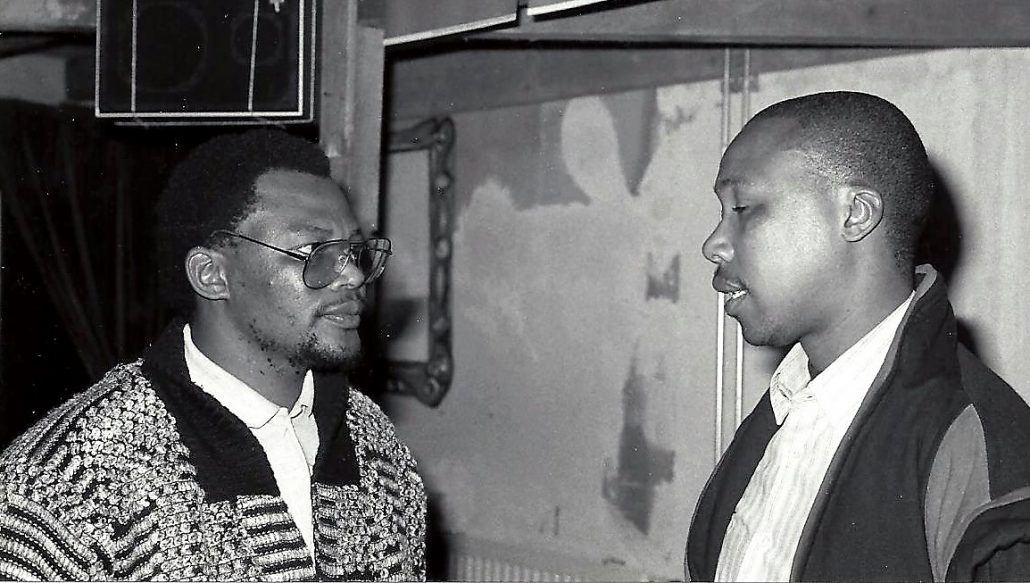
Itumeleng Mosala (AZAPO) and Sizwe Mfaxa (PAC exile)
Steve Bikoplaats (Steve Biko Court) and Lilian Ngoyiweg (Lilian Ngoyi Road) in Rotterdam
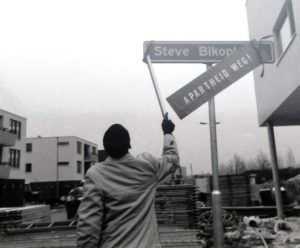
Thabo Makhabane (BCM in exile)
In Prinsenland, a new residential area in Rotterdam, the street names Steve Bikoplaats and Lilian Ngoyiweg were unveiled. This was the result of years of street names action by the Azania Komitee and Rotterdam Tegen Apartheid23.
Thabo Makhabane, Black Consciousness Movement representative, unveiled the street names and said: ‘The struggle we fight does not only affect South Africa, not only Africa, but all people.’
Mike Tsolo spoke for the PAC: ‘I am honoured to have been invited, Rotterdam should feel honoured with the Steve Bikoplaats…Remains a district in Rotterdam where many streets have been named after our oppressors. I keep hoping that will change one day.’ Tsolo is referring to the Rotterdam Afrikaanderwijk (Afrikaander district). On 16 June 1978 the Azania Komitee renamed the Afrikaanderplein (Afrikaander Square) to Azaniaplein (Azania Square). On that occasion Tsolo appealed to the Rotterdam politicians to replace the names of the oppressors by those of the freedom fighters. To date that appeal has been unsuccessful.
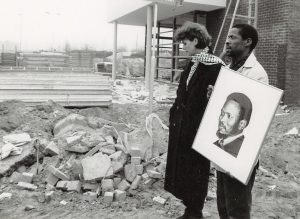
Thabo Makhabane (BCM in exile) and Marjan Boelsma (Azania Komitee)
Harriet Matiwane of the ANC women’s organization, unveiled the Lilian Ngoyiweg.24. She drew attention to the fate of the countless political prisoners in South Africa.
Partij van de Arbeid (Labour Party) – alderman Yvonne de Rijk expressed her hope that as a result these people ‘continue to live in our memories because of their protest against inhumanity.’
1991
Soweto 15 years
SAYRCO and AZAPO
Biko remembered
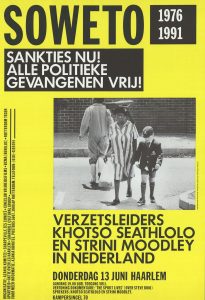
Poster Azania Komitee
With the slogans Sanctions Now and All Political Prisoners Free the Azania Komitee organized together with others25 Soweto 15 years commemorations in Amsterdam, Haarlem, Rotterdam and Nijmegen. Strini Moodley and Khotso Seathlolo spoke for AZAPO and SAYRCO (South African Youth Revolutionary Council)26.
Seathlolo was imprisoned on Robben Island from 1982 to 1991 for among other things ‘recruiting young people for military training’ and ‘by force subverting the Republic of South Africa’. In 1976 he was the second President of the Soweto Students’ Representative Council27 .
Strini Moodley was one of the 9 SASO/BPC leaders who was convicted in a controversial trial for organizing Viva Frelimo rallies in the liberation of Mozambique in 197428. He had been imprisoned on Robben Island for 5 years and after his release he was placed under a banning order.
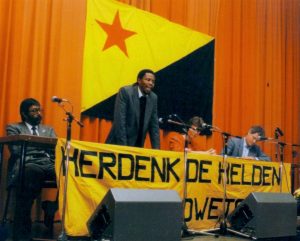
Srini Moodley (AZAPO), Khotso Seathlolo (SAYRCO), Marjan Boelsma, Jos Derks (both Azania Komitee)
Seathlolo said it was regrettable that the international community had stopped putting pressure on the Apartheid regime. He made a plea to enforce sanctions. ‘De Klerk has no intention of restructuring the economy, except by privatization of state-owned companies. He is speaking of releasing political prisoners, but the Sharpeville Six are still in prison. Mondo Kakaza, a strong supporter of the BCM, has been behind bars since 1977.’
Moodley appealed to everyone not to be deluded by De Klerk29. ‘He does conduct talks-about-talks, but there can be no real negotiations between two unequal parties. At the same time as you here in the West are rolling out the red carpet for De Klerk , South Africa is clenching its fists. If De Klerk genuinely wanted peace and democracy, if he truly wanted to demonstrate his integrity he could do so by resigning and handing over power to the oppressed.’
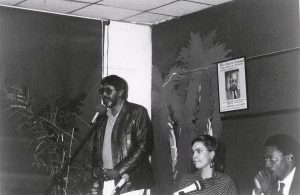
Strini Moodley (AZAPO), Jolieske Steller (Komitee Redt de Sharpeville Zes) in ‘Ons Suriname’ in Amsterdam
At the rallies the video The spirit lives was shown. The video had some interview fragments with Steve Biko. His friends Peter Jones and Strini Moodley tell in the video how Biko was arrested during an important mission intended to bring together for the first time the leaders of the three liberation movements. Biko was never seen alive again.
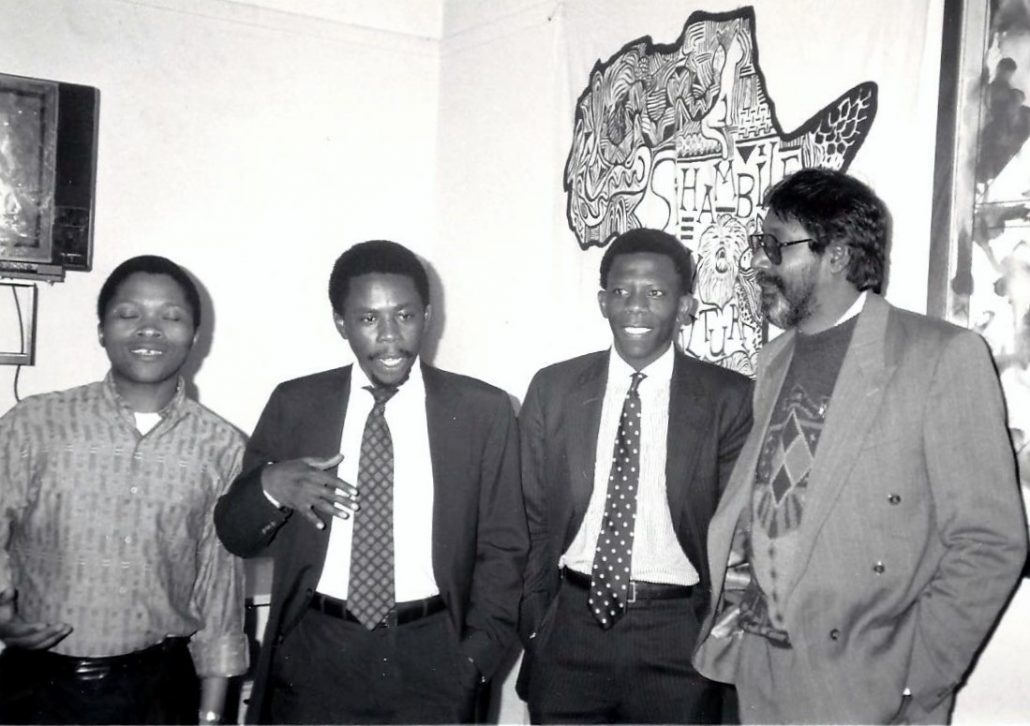
Solomon Matlanyane(Sihambile), Khotso Seathlolo (SAYRCO), Maja Moekoena, Strini Moodley (AZAPO)
Steve Biko commemorated
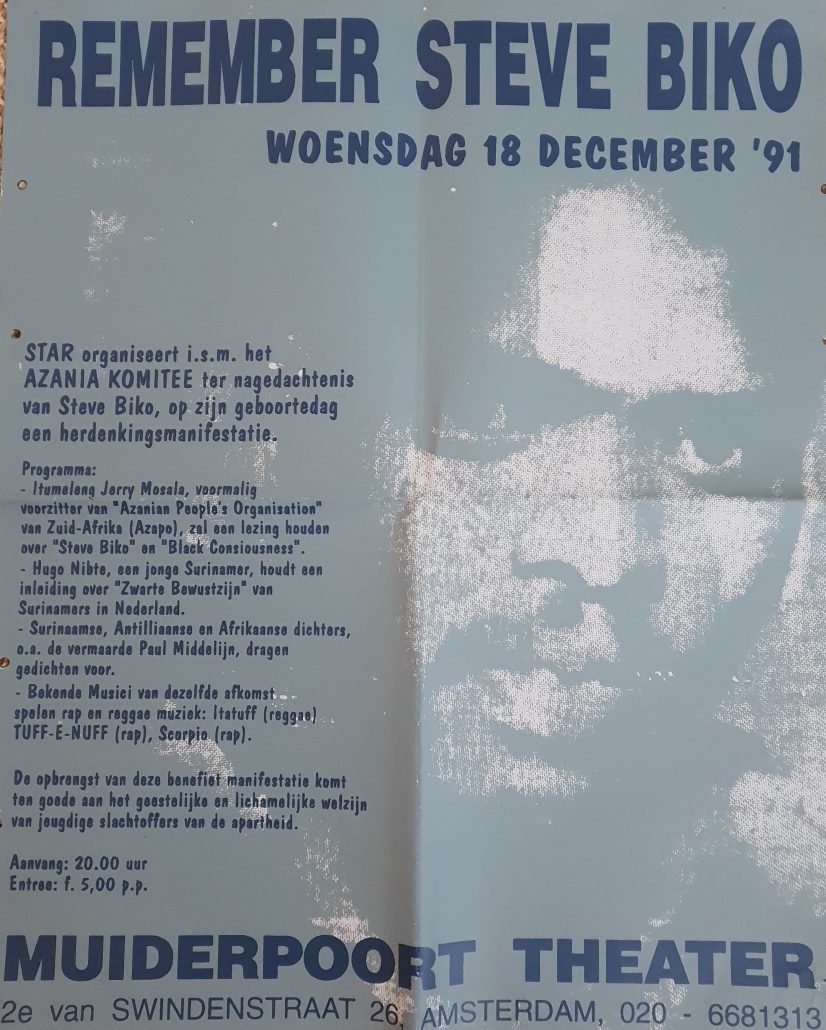
Poster meeting in Amsterdam
STAR (Stop Apartheid Racisme Discriminatie en Kolonialisme)30, together with the Azania Komitee, in December 1991 events in several places in commemoration of Steve Biko. AZAPO leader and theologian Professor Dr. Itumeleng Mosala was the guest speaker. Other speakers related the philosophy of Black Consciousness to the position of black people in the Netherlands.
In Amsterdam Hugo Nibte spoke about the Surinamese Dutch and their experience with Dutch authorities. There was also poetry by Paul Middellijn, rap music by Scorpio, Tuff-e-Nuff and reggae by Itatuff.
At the University of Amsterdam Mosala spoke about the role of the black churches in the liberation struggle of South Africa. Meindert Fennema, then lecturer at the Faculty of Social Sciences, led the discussion.
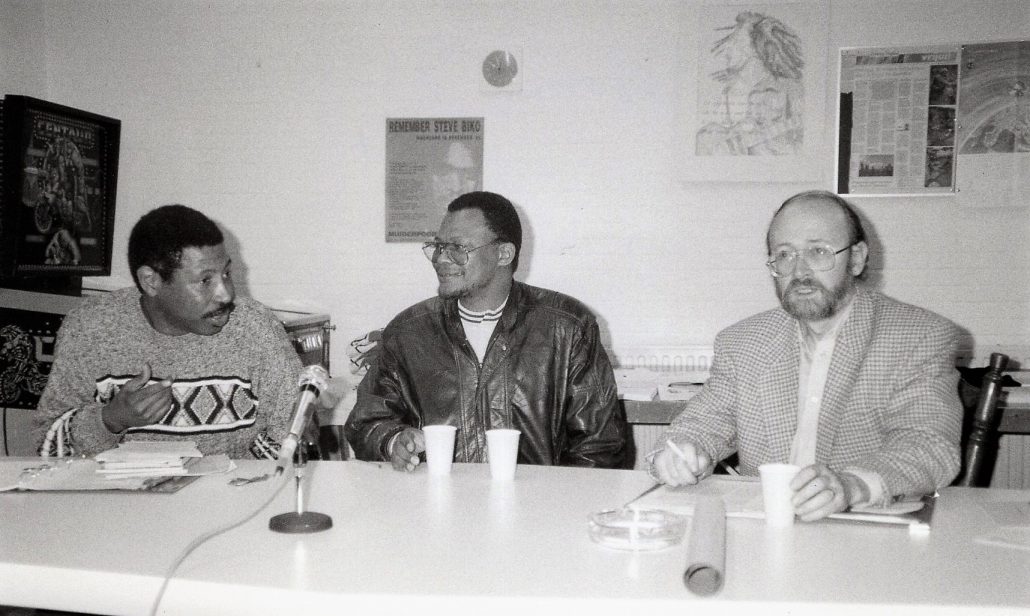
Genny Cornelia, Itumeleng Mosala, representative Sittard Against Apartheid
In Sittard also Genny Cornelia of the Foundation Political Education Antilleans spoke. In Driebergen Mosala was a guest at De Horst College, led by the teacher Oscar Campbell.
Mosala: ‘The last thing AZAPO wants is to be included in a false system in which you are the enforcer of your own oppression.’
1993
Negotiation process criticized
Strini Moodley and Itumeleng Mosala visited the Netherlands and Belgium. In the Netherlands they spoke at events organized by the Azania Komitee, Sihambile Cultural Group, Sittard Tegen Apartheid en Racisme and Cineclub Vrijheidsfilms.
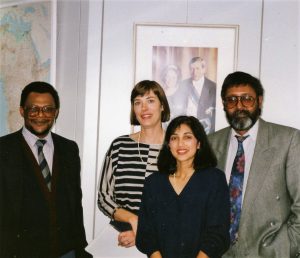
Itumeleng Mosala and Strini Moodley at the Dutch Foreign Office in The Hague
Central were the coming elections in 1994 and negotiations in preparation for those. Moodley and Mosala explained why AZAPO would not take part in the 1994 elections. They asked themselves: ‘Will the current negotiation process create a just situation and lasting peace?’
Itumeleng Mosala (AZAPO) and Strini Moodley at the Dutch Foreign Office in The Hague
The strategy of De Klerk: ‘On the one hand peace talks and negotiations in order to obtain the support of the black population and the international allies of the white community. On the other hand he uses the army and the police to terrorize and destabilize the black community. He is hoping to bring about change without changing.’
AZAPO demands a constituent assembly and next on that basis free elections.
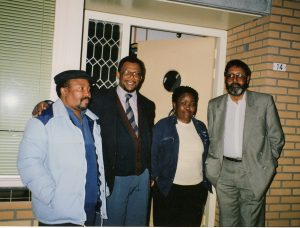
Nyakane Tsolo (PAC), Itumeleng Mosala (AZAPO), Gladys Tsolo (PAC), Strini Moodley (AZAPO) in Rotterdam
In Brussels Mosala and Moodley visited the European Community (EC, precursor of today’s EU). There they found out that the EC believed that the negotiating process in South Africa delivered exactly what the EC had asked for. AZAPO’s opinion did not count. In the meantime all the projects submitted by AZAPO were rejected by EC’s fund manager, Kagisotrust31.
_________________________________________________
© Marjan Boelsma, December 15, 2019
English translation: HippoLingo
© Pictures: Azania Komitee, Cineclub Vrijheidsfilms, Jan Warner
Reproduction of articles or parts of articles is authorized, providing the source is acknowledged and that passages and quotations are not placed in a different context
Notes
[1] Soweto uprising 1976 https://tegenhetvergeten.nl/en/2019/08/25/soweto-uprising-1976-one-sided-international-solidarity/
[2] History (part 2) Sharpeville Commemorations https://tegenhetvergeten.nl/en/2018/10/30/history-sharpeville-part-2/ and History Sharpeville (part 1) https://tegenhetvergeten.nl/en/2018/05/08/sharpeville-2/
[3] Soweto uprising 1976 https://tegenhetvergeten.nl/en/2019/08/25/soweto-uprising-1976-one-sided-international-solidarity/
[4] PEN supports authors who are in prison or are persecuted as a result of suppression of freedom of speech
[5] https://tegenhetvergeten.nl/en/2019/08/25/soweto-uprising-1976-one-sided-international-solidarity/
[6] ‘In the final analysis we believed that we would not imitate white theatre, white values. We had to stand on our own. We would not respond or react to the white man’s concept of us. We were not going to portray plays and musicals based on chiefs, maidens and witch doctors, musicals that escaped the realities that we faced. We were not going to be exploited by white directors in the name of work at last for black actors, better and bigger wage packets, offers of tours of America and Europe. Our duty was with the people of South Africa, bringing to them their joy and their pain on stage’, Sam Moodley in https://www.sahistory.org.za/sites/default/files/Paper_Sam_Moodley.pdf
[7] The Federation of Music/Sranan Kultura was engaged in Surinamese art and solidarity with the liberation struggle in Africa and other parts of the world
[8] Co-signatories PPR, PSP, CPN, D’66, and EVP, MPs Wallage (PvdA) and Scholten (CDA) and Movement X-Y
[9] See for NUSAS and the emergence of the black student movement SASO: Soweto uprising 1976 https://tegenhetvergeten.nl/en/2019/08/25/soweto-uprising-1976-one-sided-international-solidarity/
[10] Azania Vrij, 1983, 9/4
[11] On the background and emergence of these organizations see https://tegenhetvergeten.nl/en/2019/08/25/soweto-uprising-1976-one-sided-international-solidarity/
[12] These organizations drafted the Manifesto of the Azanian People. The manifesto speaks out in favour of a democratic, anti-racist and socialist Azania. The basic principles were: anti-racist, anti-imperialist, anti-sexist and against collaboration with the ruling class with all its allies and political instruments
[13] Interview Azania Vrij, 1985, 11/1
[14] see https://tegenhetvergeten.nl/en/2019/08/25/soweto-uprising-1976-one-sided-international-solidarity/
[15] In a future article more about the ‘Sharpeville Six’
[16] Het Vrije Volk, 16/6/1986
[17] Mogobe Ramose fled the country after the Soweto uprising in 1976. He continued his studies in political science and philosophy at the Catholic University of Louvain, where he took a PhD in philosophy. In the Netherlands his book Ubuntu was published. Translated by Carola Kloos. Ten Have, Antwerpen, 2017
[18] Azania Vrij, 1987, 13/1
[19] Azania Vrij, 1987, 13/4
[20] Sihambile Cultural Group was formed by South African refugees in Nijmegen
[21] In a future article more about the Upington 14
[22] Azania Vrij, 1990, 16-1/2
[23] Azania Vrij, 1990, 16-3/4
[24] Lilian Masediba Ngoyi was co-founder of the Women’s Division of the ANC, FEDSAW (Federation of South African Women). In 1956 she led a large demonstration of women against the pass laws
[25] Aktie Overleg Haarlem, Black Consciousness Movement of Azania (BCMA) Benelux, Cineclub Vrijheidsfilms, Rotterdam Tegen Apartheid, Sharpeville Zes Comité and Sihambile Cultural Group
[26] Azania Vrij, 1991, 17/3
[27] see https://tegenhetvergeten.nl/en/2019/08/25/soweto-uprising-1976-one-sided-international-solidarity/
[28] ibid
[29] In 1990 De Klerk was officially received in the Netherlands
[30] STAR was an organization of migrants and native people who fought against Apartheid, racism, discrimination and colonialism. Formed from the former Black People In Holland Against Apartheid. Azania Vrij, 1988, nr. 4
[31] https://tegenhetvergeten.nl/en/2019/08/25/soweto-uprising-1976-one-sided-international-solidarity/
